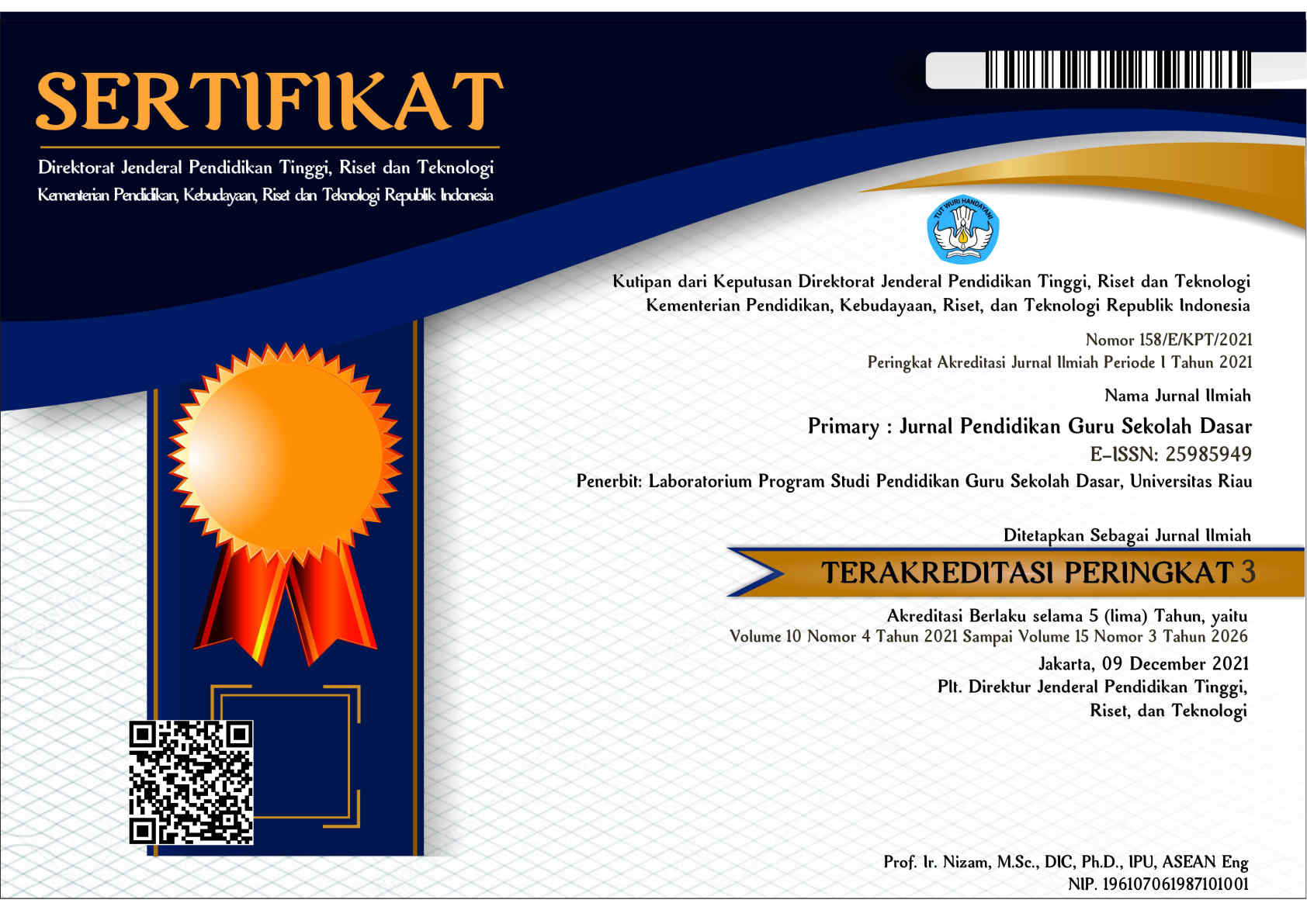THE PHENOMENON OF CHEATING AMONG ELEMENTARY SCHOOL STUDENTS
Abstract
Cheating on Elementary School Students has occurred for a long time but it is still hard for teachers and the schools to overcome this phenomenon. Cheating will cause the children to be dishonest in achieving a high score. Besides, cheating will also be impactful until the students become adults. This behavior is harmful to other students who have studied hard and been honest in completing exams and assignments from teachers at school. Cheating is an act that is dishonest, fraudulent, and justifies anything to get a high score in completing the task, especially on tests or exams. This article applied a literature review as the research methodology to explain the situational, dispositional, personal, and external factors causing cheating. It was observed that cheating mostly acted by students were changing the answers in the exam after reading notes when the teacher was out of the classroom, using the notes prepared for answering the questions, looking at or asking for answers from other students, and allowing other students to view or copy his answers. This article encouraged the participation from parents, classroom teachers, and school institutions to work together to improve the students’ self-awareness in order that cheating would not become a habit to reach a high score in the future.
Keywords
Full Text:
PDF (English)References
Feist, J., G, J, Feist. (2010). Teori Kepribadian: Theories of Personality. Jakarta: Salemba Humanika.
Ghufron, M. N., Rini, R, S. (2010). Teori-teori Psikologi. Yogyakarta: Ar-Ruzz Media.
Hamdani, R, U. (2014). Mencontek…? Yuk!! Hmm…, Nggak Ah!!. Jakarta: Transmedia.
Hartanto, D. (2012). Bimbingan dan Konseling Mencontek: Mengungkap Akar Masalah dan Solusinya. Jakarta: Indeks Jannah.
Koesoema, D. (2010). Pendidikan Karakter. Jakarta: Grasindo.
Kushartanti, A. (2009). Perilaku Mencontek Ditinjau dari Kepercayaan Diri. Indigenous. Jurnal Ilmiah Berkala Psikologi, 11(2).
Muslich, M. (2011). Pendidikan Karakter: Menjawab Tantangan Krisis Multidimensional. Jakarta: Bumi Aksara.
Musslifah, A, R. (2008). Perilaku Menyontek Siswa Ditinjau dari Kecenderungan Locus of Control. Skripsi (tidak diterbitkan). Surakarta: Fakultas Psikologi Universitas Muhammadiyah Surakarta.
Prabaningrum, D, W. (2013). Menyiapkan Anak Untuk Sukses di Sekolah dan Kehidupan. Jakarta: PT Indeks.
Pudjiastuti, E. (2012). Hubungan “Self Efficacy” dengan Perilaku Mencontek Mahasiswa Psikologi. Jurnal Terakreditasi, (Online), Vol. XXVIII (1).
Riyanti. (2015). Intensi Mencontek Ditinjau dari Theory of Planned Behavior. Jurnal Ilmiah Psikologi Terapan, (Online), 03(02).
Sari, I. (2013). Locus of Control dan Perilaku Mencontek serta Implikasinya Terhadap Bimbingan dan Konseling. Jurnal Ilmiah Konseling, 4(1).
Sugiyono. (2015). Metode Penelitian Kuantitatif, Kualitatif dan R & D. Bandung: Alfabeta.
Suwartini, S. (2018). Pengembangan Buku Ajar Pendidikan Karakter dengan Pendekatan Pembelajaran Berbasis Soft Skill Pada Siswa SD Kelas II. Jurnal Educhild, 7(2).
Yusuf, S., Nurihsan, J. (2007). Teori Kepribadian. Bandung: PT. Remaja Rosdakarya.
DOI: http://dx.doi.org/10.33578/jpfkip.v9i6.8090
Refbacks
- There are currently no refbacks.
Copyright (c) 2020 Daviq Chairilsyah

This work is licensed under a Creative Commons Attribution-NonCommercial-ShareAlike 4.0 International License.
____________________________________________________________
Primary: Jurnal Pendidikan Guru Sekolah Dasar
Secretariat
Program Studi Pendidikan Guru Sekolah Dasar
Gedung B1, FKIP Universitas Riau
Kampus Bina Widya Km. 12,5 Simpang Baru Panam
Pekanbaru Riau Indonesia 28293
e-mail : primary@ejournal.unri.ac.id



